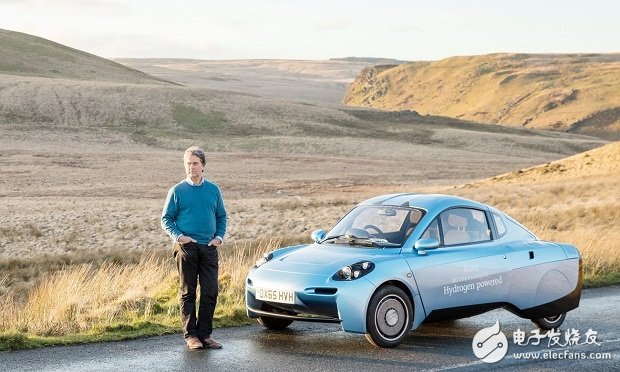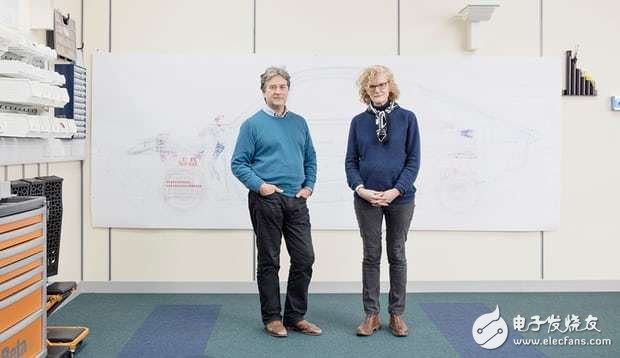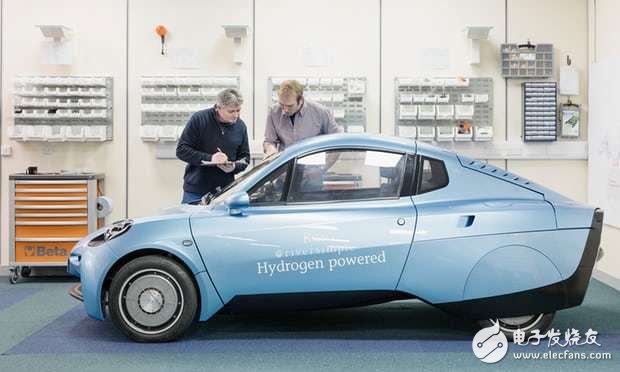The research and development of fuel cell technology has been very slow. The automotive industry has been unable to eliminate the dependence on fossil fuels. Compared with its energy Battery, hydrogen has certain advantages. Hydrogen fuel cells are passed through a pile of super Capacitor-charged, hydrogen-powered car advocates have long believed that it is more practical.
On February 7th, in the mid-1990s, Hugo Spowers operated a Formula 3 racing team. At the time, motorsports were in the hands of Big Tobacco, and every weekend, Formula 1 cars with the brand names of Marlboro, Camel and Silk Cut were launched and presented to millions of viewers on television screens. Spowers said: "We all know that smoking is a chronic suicide. The racing industry is describing a link between smoking and the winner. This is ridiculous, but no one has objected."

So in 1995, the Spowers team built a car with the anti-smoking campaign logo, which caused riots. Spowers is indifferent to this and he knows he is right. But the racing industry has changed very slowly, and Spowers' plans are hardly supported. After the dilemma of the dream and the lack of funds, he quickly withdrew from the game. It was not until 2006 that motor sports finally banned tobacco advertising. Although Spowers has been questioned, ridiculed and roared, he also learned to be patient. He claims that sometimes the only way to distinguish between a fanatic and a dreamer is to wait.
The 57-year-old Spowers has been full of gray hair. For the past 16 years he founded Riversimple and served as chief engineer, a small hydrogen-powered car company based in Llandrindod Wells. In 2016, the company designed a car, Rasa, an ultra-light two-seater powered by a hydrogen fuel cell. This year, the company will conduct beta testing of 20 vehicles in Monmouth County (pre-market trials). If all goes well, Spowers hopes to bring the product to market in 2019. He claims: "As far as we know, we are the only independent hydrogen fuel cell car startup in the world."
Riversimple is headquartered in a small industrial park in the Welsh countryside, surrounded by mountains and accompanied by a stream. Spowers employs 19 people and several engineers in the assembly shop are gathering around Rasa's first chassis. The chassis was just sent from the supplier of Melton Mowbray, and the engineers needed to test the other 19 chassis before ordering it.
Rasa is sprayed in light blue and has a sleek design. Its unique aerodynamic shape was designed by Chris Reitz, who was involved in the design of the Fiat 500. Spowers said: "We want to design the car that people need, not the car that causes ecological damage." The entire car weighs only 580 kilograms, less than half the weight of Volkswagen Golf, and only the weight of the Tesla Model S. One quarter.
Its chassis is carbon fiber and uses a tire with low rolling resistance. In order to reduce weight, the design of each component makes the designers struggle. Because the lower the weight of the car, the less energy it needs. This car can achieve 100 km acceleration in 10 seconds, comparable to Ford's carnival. It has a cruising range of about 300 miles (about 482 kilometers), and this process requires only 1.5 kilograms of hydrogen and a small 8.5kW fuel cell. In contrast, Toyota's hydrogen fuel cell vehicle Mirai needs 5 kilograms of hydrogen fuel to be able to travel the same mileage.
Hydrogen fuel cells are charged by a stack of supercapacitors that provide the extra power needed to accelerate a four-wheeled electric vehicle. Engineers designed a revolutionary feedback brake system that captures most of the energy wasted during braking and sends it back to the supercapacitor. Spowers claims that using renewable energy as a fuel will make Rasa a competitor to most sustainable cars in the world.
Rasa's gull-wing door opens to an unusually large space. After Spowers turned on a series of switches, the fuel cell and air compressors started working and produced a huge noise that felt like sitting in a Deronin car. Since the car is only a prototype, it has no heating, and the LCD screen of the instrument panel does not work, but even then it cannot hide its perfection.

The first car that Riversimple built was LIFECar, which was completed in cooperation with the car manufacturer Morgan. When LIFECar made its debut at the 2008 Geneva Motor Show, it was considered a breakthrough. It weighs only 650 kilograms and can reach speeds of 90 miles per hour (about 145 kilometers per hour). Charles Morgan, general manager of the company, recalled: "In 2007 it was only to verify whether it could build a zero-emission sports car." But in the end the company thought it was too costly to stop production, and Morgan said that the breakthrough will never be so easy.
Riversimple later used LIFECar technology to create a prototype of a low-cost compact smart car called Hyrban. The company plans to conduct a consumer experience in Leicester, but the project ultimately did not receive sufficient funding and government approval. In 2015, Riversimple welcomed the opportunity, and the Welsh government allocated £2 million to the company to develop Rasa. The EU then provided €2 million for the beta test. But then in June 2016, the UK voted to leave the EU. Spowers is very worried about the impact of Brexit on the company. He claimed: "The EU giants and European investment banks will disappear." The recent meeting with a representative of the European Investment Bank also confirmed his concerns.
The automotive industry has been unable to lift its dependence on fossil fuels, and electric vehicles account for less than 2% of new car sales, but this situation is expected to change soon. In 2017, the UK and France announced plans to ban the sale of new gasoline and diesel vehicles by 2040. Germany and China are also expected to implement similar policies. Volvo plans to start producing all electric or hybrid vehicles from 2019. Every major manufacturer invests heavily in the research and development of electric vehicles, such as Tesla and Nissan.
For a long time, the automotive industry has been exploring how to make hydrogen fuel cells a substitute for internal combustion engines. However, the development of fuel cell technology has been very slow. They are expensive to produce (platinum is a key component) and hydrogen is flammable and difficult to store. Although hydrogen can be produced in a regenerable manner by electrolysis or the like, its more common source is natural gas, and carbon dioxide is produced during the manufacturing process. Therefore, Tesla's Elon Musk called the technology "fool battery technology."
Proponents of hydrogen-powered cars have long believed that it is more practical. Hydrogen-powered vehicles have a cruising range of more than 300 miles (about 482 kilometers) with fuel, and the inflating takes only a few minutes, which is equivalent to the fueling time of gasoline vehicles, and now electric vehicles take hours to complete charging. Spowers said: "You can fill the car with oil in 5 minutes, and Tesla cars with super chargers take 30 minutes to charge, but every 120 cycles you need to replace them. Every Tesla charger It's 120kW, which means you need a 14.4mW substation that is enough to power 32,000 homes in the UK."
In addition, solar and wind energy are intermittent energy sources, prompting the government to invest money in power storage technology. In contrast, hydrogen has the advantage that it can be manufactured with excess renewable energy at peaks and then stored in tanks or underground caverns. More importantly, because hydrogen does not emit carbon dioxide when burned, it can supplement or replace natural gas in home heating and commercial applications, and nearly one-third of all carbon dioxide emissions in the UK come from natural gas. Although this technology is currently too expensive, the process of upgrading the grid to meet the needs of electric vehicles is equally expensive.
At the 2017 World Economic Forum in Davos, a consortium of companies including Toyota, Honda, Daimler, Shell and BMW announced the establishment of a hydrogen power committee dedicated to the research and lobbying of hydrogen fuel technology. Japan has announced plans to become the world's first country to promote hydrogen fuel, and build 35 hydrogen fuel stations by 2020. Toyota Motor Corporation, which previously promoted hybrid vehicles, has re-invested in hydrogen fuel, creating a hydrogen-fueled car Mirai with a price of £65,000. Hydrogen fuel cell buses and trucks are also being developed.
But the hydrogen fuel cell cars built by Spowers are much simpler, and the designs of other companies are too heavy. He claims: "Tesla uses more batteries than we use." He claims that he is not opposed to the use of batteries, he just wonders why manufacturers are trying to increase hydrogen fuel to current cars. He said: "That's why hydrogen fuel cars are expensive because you want to add them to traditional cars. But if you design a car around hydrogen fuel, you can essentially overcome those obstacles."

When Spowers stepped out of motorsport, he considered leaving the car industry completely. Later, Spowers began research on an MBA (his thesis explores the viability of fuel cell vehicles) and came to a dramatic conclusion: To make the automotive industry sustainable, it involves more than just hydrogen. The fuel industry also needs a completely different business model for fuel or battery problems.
According to Spowers, traditional car companies will never solve our environmental problems. Their interest lies in maximizing resource consumption so that they can maximize their benefits. So Spowers' plan is not to sell Rasas, but to lend them to consumers, to set taxes and miles. The cost of the consumer's car will also depend on the price of hydrogen fuel at the time, but all prices must be less than £500 per month (which includes fuel and insurance costs). Their goal is to make Rasas' monthly operating costs comparable to Volkswagen's golf. Spowers said: "We are the only car company in the world that never wants to sell a car."
This rental model can make Rasa's expensive carbon fiber chassis cost-effective because it increases the life of the car, and longer car life means more benefits to the company and less natural resources. Spowers explained: “From an environmental perspective, we bring resource protection rather than resource consumption.†Spowers hopes to eventually assemble 5,000 cars a year in Wales and employ up to 220 people.
However, the company's funds have already encountered difficulties. Recently, the company has begun to attract the interest of international investors, especially Chinese investors, but this also requires outsourcing production and full sales of Rasa. This will be completely contrary to the idea of ​​Spowers. Ultimately Riversimple's success may depend on factors beyond his control. At the same time, the cost of battery technology is declining, energy density and solid-state battery technology are also developing, which may bring changes in the automotive industry.
Spowers insists: "I don't object to using batteries. If battery technology comes, we will not protect hydrogen fuel technology for the benefit. We can easily replace the power system. We are not a hydrogen-powered car company, but a sustainable development. Auto companies.†Spowers is still very optimistic about the company's prospects, and more than 800 people have applied for beta testing. Riversimple is also designing a four-seat car model and is also a lightweight wagon. Spowers believes that one day the world will agree with his ideas.
High Frequency Inverter Charger
High Frequency Inverter Charger,High Frequency Inverter Transformers,Inverter Charger,High Frequency Car Power Charger
SUZHOU DEVELPOWER ENERGY EQUIPMENT CO.,LTD , https://www.fisoph-power.com